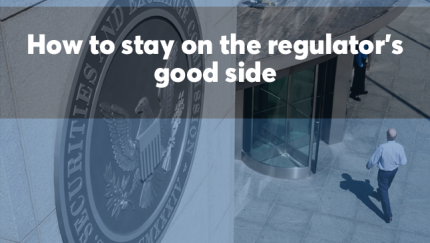WASHINGTON —The SEC's fiduciary rule may be on the back burner for a while longer.
The regulator has been authorized to create such a rule under the 2010 Dodd-Frank law, but Chairwoman Mary Jo White emphasized that the process is extraordinarily complex and the SEC is missing two of its five commissioners.
"I have made clear that I am one vote," White said at SIFMA's annual conference.

Yet even while White emphasized a fiduciary rule is "enormously important," she added: "As you know there are different views among different commissioners, so I've made clear that it is not [happening] any time soon."
-
Additional guidance on the new regulations will come regularly, according to Deputy Assistant Secretary Timothy Hauser.
September 16 -
Mounting regulatory pressure will push firms to decrease the number of products available due to compliance risks, Cerulli Associates says in a new report.
September 29 -
From hiring sprees to accelerating software launches, companies are gearing up for the significant expenses and changes wrought by the new regulation.
September 8
The SEC's delay comes as the Department of Labor has moved ahead with its own fiduciary regulation. Firms across the industry are preparing to implement the rule, which goes into effect in April 2017.
From recommending wrong share classes to cherry-picking allocations, these are the pitfalls advisers should avoid.
'WE DON'T ENFORCE THEIR RULES'
White said she expected an eventual SEC rule, which is authorized under a different law than the Labor Department's rule, to have some differences. But she did not specify what those variations would be.
The SEC would coordinate its rule-making with the Labor Department, White said. Though she also emphasized that they are separate agencies.
"We don't enforce their rules, obviously, they do," White said.
"I think we've had within the last 2 years 2,000 new advisers register with the SEC. With the DOL rule, we'll see more movement there," SEC Chairwoman Mary Jo White said.
The chairwoman also lamented a lack of resources at the SEC to provide sufficient oversight of investment advisers.
"There is no greater investor protection we provide than to have boots on the ground. We are constantly trying to increase the frequency of exams. We do a lot data reviews. But we need significant more resources to reach even just a 50% coverage rate," she said.
Worse, the scope of the SEC's responsibilities is growing.
"I think we've had within the last 2 years 2,000 new advisers register with the SEC. With the DOL rule, we'll see more movement there," she said.
Kenneth Bentsen, the CEO of SIFMA who was the moderator for White's talk at the trade group's conference, noted firms' frustration with overlapping regulators.
"By one count some firms may have 13 different regulators, including federal, state and SROs," he said to White. "There is a growing concern that, are we all rowing in the same direction?"
For her part, White said that regulators needed to strike a balance between avoiding needless overlap with situations where a one size fits all approach isn't appropriate.
"There are coordination challenges. There is no question about that," White, who has served as SEC chairwoman since 2013, said.
However, she said, in key areas such as cybersecurity, the commission has been working closely with its fellow regulators.
"I don't see any bigger risk to financial marketplace than cyber. From point of view of the SEC, we are focused on our data protection and having enhanced systems in place when cyberattacks occur," she said.






